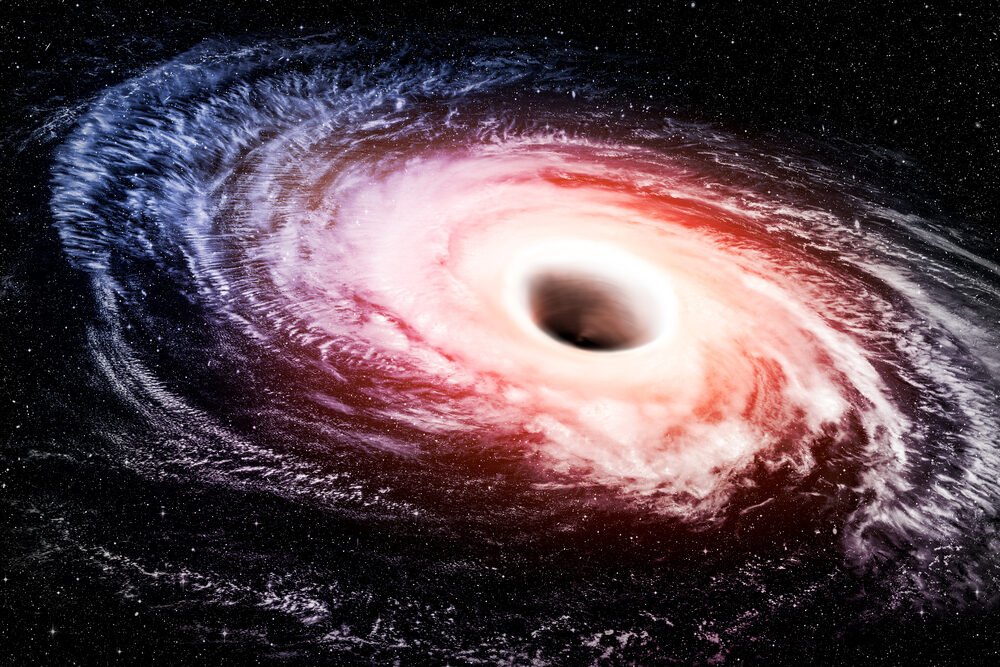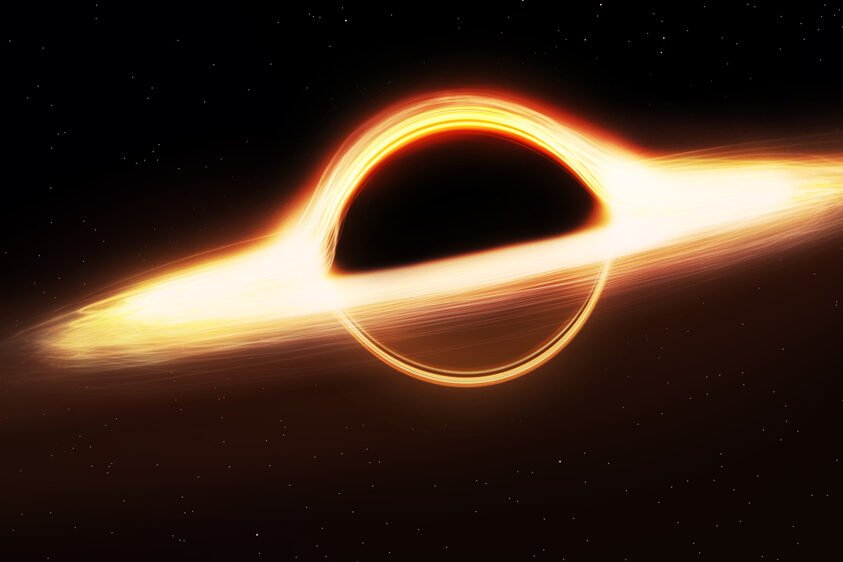Gravity Isn’t Just Heavy, It Warps Time Itself

When we think of gravity, we usually picture apples falling or planets orbiting. But near a black hole, gravity is so extreme that it bends not just space, but time itself. Imagine time as a calm river, flowing evenly everywhere you go. Close to a black hole, that river twists, slows down, and even stretches out in strange, mind-bending ways.
Experts in astrophysics explain that this happens because black holes have such a strong gravitational pull that they literally curve the fabric of the universe. This phenomenon is known as gravitational time dilation. The closer you get to the black hole, the slower time moves compared to someone far away. It is not science fiction. It is a real, measurable effect predicted by Einstein’s theory of general relativity. In a way, black holes do not just swallow light and matter. They also mess with the ticking of time itself.
If You Fell Toward a Black Hole, Time Would Stretch Infinitely
Imagine falling toward a black hole. To you, time would feel perfectly normal. Your heart would beat steadily, your thoughts would flow just like always. But to an outside observer watching you from a safe distance, it would look like you were slowing down dramatically, almost freezing in time right before you reach the black hole’s edge.
This dramatic time-stretching effect is why black holes seem so mysterious. Scientists describe that to distant viewers, you would never actually appear to fall into the black hole. Instead, you would linger forever at the event horizon, the point of no return. Your image would fade away slowly, redshifted into oblivion. Meanwhile, from your perspective, you would continue falling normally — until tidal forces tear you apart, but that is another intense story. This clash between personal experience and outside observation makes black holes one of the strangest objects in the universe.
The Event Horizon Is Where Time Plays Its Greatest Trick
The event horizon of a black hole is often called the “point of no return,” and for good reason. It is the invisible boundary where the black hole’s gravity becomes so strong that not even light can escape. But it is also the place where time behaves in ways that defy common sense.
Physicists studying black holes explain that right at the event horizon, time practically stops for an outside observer. Imagine watching a spaceship fall toward a black hole. The closer it gets to the event horizon, the slower and slower it appears to move, until it seems frozen in place forever. From the spaceship’s point of view, though, time moves forward normally until they cross the boundary and head toward the unknown. This strange dual reality is a perfect example of how black holes turn the rules of time upside down.
Time Dilation Near a Black Hole Could Let You Time Travel Into the Future
One of the most mind-blowing consequences of black hole physics is the possibility of traveling into the future. Not by hopping into a machine, but simply by experiencing time differently near a black hole. If you could somehow orbit close to a black hole safely for a few hours and then return to Earth, you might find that many years had passed here while only a few days went by for you.
This is not fantasy but a real prediction based on the way black hole gravity stretches time. Scientists compare it to a natural form of time travel into the future, no wormholes or flux capacitors needed. Of course, surviving the intense radiation and tidal forces near a black hole would be its own massive hurdle. Still, it is wild to think that near one of these cosmic monsters, you could literally skip ahead in time without doing anything except being in the wrong — or the right — place.
The Stronger the Gravity, The Slower the Time
Gravity and time are locked in a delicate dance. Wherever gravity is stronger, time moves slower. This effect happens everywhere, even on Earth, though it is so tiny here that you never notice it. Atomic clocks placed at the top of mountains actually tick a little faster than those at sea level because gravity is slightly weaker higher up.
Now imagine that principle pushed to the extreme by a black hole. Astrophysicists explain that near a black hole, the difference in time is not just milliseconds but could be years or even centuries depending on how close you are. Gravity becomes a time bender, warping the flow of seconds and minutes into something strange and almost unrecognizable. It is a chilling reminder that black holes are not just cosmic vacuum cleaners but also master manipulators of reality itself.
Inside the Black Hole, Time and Space Switch Places
It sounds unbelievable, but according to current scientific understanding, once you cross the event horizon of a black hole, space and time actually switch roles. In normal life, time moves forward while space gives you the freedom to move around. Inside a black hole, it is the opposite. Moving forward becomes like moving toward the center of the black hole. There is no stopping it, no changing course.
Experts in general relativity explain that falling into a black hole means your future is quite literally at the center, just like tomorrow is unavoidable here on Earth. No rocket, no thruster, no miracle maneuver could change your fate. It is an eerie and unsettling thought that beyond the event horizon, you would be dragged inexorably to the singularity where time, space, and matter all break down into something we still cannot fully understand.
Black Holes Stretch Light and Time Together

When you approach a black hole, you are not just seeing strange effects on time. Light itself gets stretched and bent in bizarre ways too. A phenomenon called “gravitational redshift” happens where the light escaping from near the black hole gets stretched into longer and longer wavelengths. The light becomes redder and eventually fades away entirely.
Astrophysicists describe this as another sign of time slowing down near the event horizon. Because light and time are so interconnected, when time stretches, so does light. If you could hover near a black hole and look out at the universe, everything would seem weirdly blue-shifted and fast at first. But looking back toward the black hole, light would dim, stretch, and ultimately vanish into darkness. It is a beautiful but haunting reminder that in the extreme gravity near a black hole, even the basic rules of how we see and experience reality begin to fall apart.
Black Holes Prove That Time Is Not Absolute
For most of our everyday lives, time feels steady and universal. One second on your watch is one second for everyone else, no matter where they are. But near a black hole, that illusion completely shatters. Time becomes relative — your experience of time depends entirely on where you are and how fast you are moving.
Einstein’s theory of general relativity predicted this long before we could observe it, but black holes offer the most extreme proof. Scientists studying the behavior of matter near black holes observe massive differences in the passage of time depending on distance from the event horizon. It challenges everything we casually believe about the flow of minutes and hours. Black holes teach us that time is not an unstoppable river flowing the same for all. It is a flexible, twisting current shaped by gravity and motion. It is a truth that sounds almost philosophical but is grounded in the hard science of the universe.
If You Watched Someone Fall In, You Would Never See Them Cross
One of the strangest effects of a black hole’s time-warping power is what you would see if you watched someone fall in. From your vantage point far away, your friend would seem to move slower and slower as they got closer to the event horizon. Their movements would drag out, almost like a movie stuck in slow motion.
Astrophysicists explain that from your perspective, your friend would never quite cross the boundary. They would appear frozen just above the event horizon forever, growing dimmer and dimmer as the stretched light faded away. Meanwhile, for the person falling, time would feel normal as they plunged onward to their inevitable fate. This bizarre split reality — where two observers experience completely different timelines — shows just how surreal the universe becomes near a black hole. It is a place where even basic ideas like “before” and “after” lose their ordinary meaning.
Near a Black Hole, the Universe Outside Speeds Up
If you were somehow able to orbit safely just outside a black hole’s event horizon, you would notice something very odd if you looked outward at the universe. Instead of time slowing down for you, everything else would seem to be moving incredibly fast. Stars would appear to age in seconds, galaxies would spin wildly, and civilizations could rise and fall in what would feel like a blink of an eye.
Scientists describe this as the mirror side of gravitational time dilation. Because your own clock is ticking more slowly near the black hole, everything in the wider universe seems hyper-accelerated. It is a cosmic trick of perspective, but it makes it theoretically possible for someone to “fast-forward” through vast stretches of cosmic history simply by parking near a black hole. Of course, surviving the intense radiation and deadly tidal forces would be nearly impossible, but it is fascinating to imagine.
Black Holes Create a Natural Boundary in Time
The event horizon of a black hole acts not just as a physical boundary but as a boundary in time itself. Once something crosses over, it is cut off from the outside universe forever. Information cannot escape, signals cannot be sent back, and events beyond the horizon are completely isolated from the rest of the cosmos.
Researchers explain that this creates a natural kind of cosmic censorship. From our point of view, anything happening inside the black hole becomes unreachable and unknowable. It is not just a place you cannot get to. It is a place that effectively does not exist for anyone outside. This idea has huge implications for how we understand information, entropy, and even the ultimate fate of matter in the universe. It also gives black holes their air of finality — once you cross that line, in every meaningful sense, you have left the known universe behind.
Black Holes Might Hold the Key to Understanding Time Itself

In the end, black holes are not just fascinating because they eat light or stretch matter to breaking points. They are also incredible laboratories for understanding time, gravity, and the deep workings of reality. Many physicists believe that solving the mysteries of what happens inside black holes could finally unlock answers about how time really works at the most fundamental level.
Quantum physicists and cosmologists are particularly interested in how time behaves near the singularity at a black hole’s center. Right now, general relativity and quantum mechanics — our two best theories of physics — do not agree on what happens there. Black holes are the ultimate testing ground. They push the laws of nature to their limits, revealing cracks and gaps in our understanding. Studying them could one day explain not just what happens near a black hole, but why time exists at all. In a way, these dark giants might hold the blueprint for decoding the deepest secrets of the universe.
